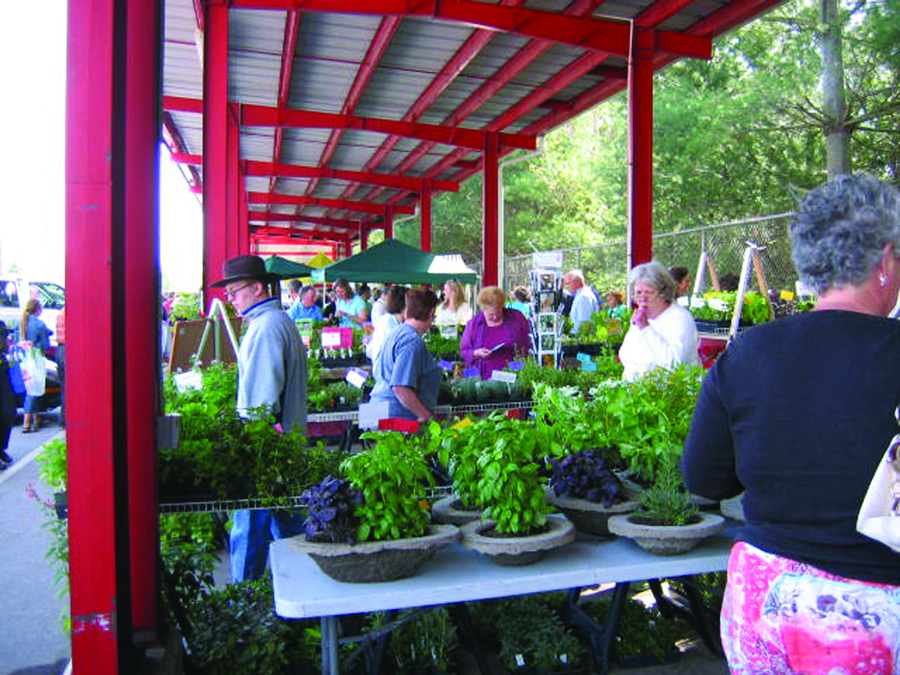A.D. Reed, executive director for the Asheville Spring Herb Festival, says attendees of this year’s event need to bring an open mind — and maybe a little extra capacity.
“If you’ve got a little red wagon, bring it with you,” Reed says. “Everyone always ends up buying more than they think they will.”
From Friday, May 4, to Sunday, May 6, the WNC Chapter of the North Carolina Herb Association hosts the 29th annual Asheville Spring Herb Festival at the Western North Carolina Farmers Market. Roughly 60 vendors from the Asheville area convene to offer everything from herbs and heirloom vegetables to compost, mushroom spores, soaps and teas.
This plentiful array speaks to the festival’s substantial growth since its origins in 1990, when only four or five vendors set up shop in the WNC Farmers Market parking lot. “In the beginning, it was just four hours on a Saturday,” Reed notes. “Now, it stretches over three days. When I started in 2000, the festival drew in 22,000 people. Now, we’ll have as many as 35,000 people. It’s the largest festival of its kind in the U.S. and Canada.”
Visitors come to the festival from Alabama, Georgia, South Carolina, Tennessee, Virginia and Maryland, Reed adds. “I even got a call from a woman in New Jersey who was traveling to Florida and wanted to make sure she didn’t miss it on her way there,” he says.
Jeannie Dunn, owner and director of Red Moon Herbs in Asheville and president of the N.C. Natural Products Association, expects vendors to do a brisk business in fruiting trees, edible landscaping and medicinal herbs this year. “People are saying, ‘How can I use this?’ and ‘What can I plant that will help sustainability?’” she says.
Part of that demand, believes Dunn, is the “foodie” inclination of Asheville-area residents and restaurateurs. “We see a lot of chefs using local herbs and local produce in the farm-to-table movement,” she says. “But we also see more people using native herbs like stinging nettle, morels and other plants native to this area in their food.”
This year’s festival also addresses the hunger for herbal education through several workshops where participants can learn more about growing and using herbs. Although workshops had been a part of the event’s early incarnations, Reed explains, they had been absent for some time before the 2017 festival.
“The workshops started in the late 1990s, early 2000s, but we couldn’t find a way to provide space for the workshops without taking away vendor space,” Reed says. “But we decided to try it again last year with master gardeners. People liked having the workshops so much that we decided to keep space available for them.”
Friday’s workshops cover growing herbs, with topics such as edible landscaping, creating an herbal first aid garden and container growing. On Saturday, the presenters shift to using herbs through demonstrations of preparing extracts, making soap and blending teas. And on Sunday, the festival concludes with a presentation by Joe Hollis on native plants.
One aspect of the festival hasn’t changed over the years, says Reed: There is no charge for attending, parking or participating in any of the workshops. The WNC Farmers Market will also be running a free shuttle to and from the parking lot to help people access the event and return to their cars with their purchases. Sometimes, a little red wagon just isn’t enough.
WHAT: 29th annual Asheville Spring Herb Festival, ashevilleherbfestival.org
WHERE: WNC Farmers Market, 570 Brevard Road, Asheville
WHEN: Friday-Sunday, May 4-6. 8:30 a.m.-5 p.m. Friday and Saturday; 10 a.m.-3 p.m. Sunday.



Before you comment
The comments section is here to provide a platform for civil dialogue on the issues we face together as a local community. Xpress is committed to offering this platform for all voices, but when the tone of the discussion gets nasty or strays off topic, we believe many people choose not to participate. Xpress editors are determined to moderate comments to ensure a constructive interchange is maintained. All comments judged not to be in keeping with the spirit of civil discourse will be removed and repeat violators will be banned. See here for our terms of service. Thank you for being part of this effort to promote respectful discussion.